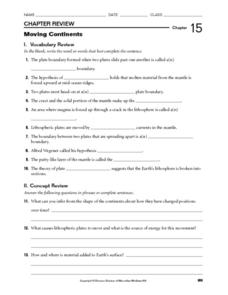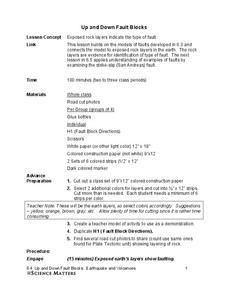It's About Time
Volcanic Landforms
Did you know the word volcano comes from the name of the Roman god of fire, Vulcan? During this activity, scholars make a topographic map, interpret topographic maps, and infer how lava will flow based on their analysis.
Curated OER
Why Are Volcanoes Dangerous?
Students investigate the causes and characteristics of volcanic eruptions including pyroclastic eruptions. They study the effects of natural disasters.
Curated OER
Volcanoes
Fifth graders study volcanoes. They watch a demonstration that represents the eruption of a volcano and discuss the similarities and differences between the model and a real volcano.
Curated OER
Plate Tectonics: Fifth Grade Lesson Plans and Activities
Fifth graders continue their investigation of the plate tectonics cycle with an exploration of the movement of Earth's crust. During the lab, young geologists conduct an experiment to discover the result of different types of stress...
Oregon State
World Map of Plate Boundaries
Young geologists piece together the puzzle of plate tectonics in an earth science lesson. Given a physical map of the world, they search for land formations that indicate the location of different types of plate boundaries.
Curated OER
Rocks: Mineral Mixtures
A 22-slide set provides pretty much everything you need to teach the rock cycle except the actual specimens. All of the slides contain graphics or photographs to help describe the process, and most even have links to educational videos....
Curated OER
Igneous Rocks/Volcanoes
Learners differentiate between the two types of igneous rock and designate the area the rock comes from.
Curated OER
Volcanoes!
Students define what a volcano is. They discover where and why volcanoes occur. They study effects of volcanoes on the Earth system.
Curated OER
Protecting Habitats and Species
Students recognize that scientists continuously gather and interpret data to understand and predict relationships among natural phenomena. They research various volcanoes and plot the volcano locations on a world map.
Curated OER
Moving Continents
In this moving continents worksheet, students review the different types of plate boundaries, what causes earthquakes, and where volcanoes are formed. This worksheet has 10 fill in the blank and 9 short answer questions.
Curated OER
Earthquakes and Volcanoes
In this earthquakes and volcanoes worksheet, students will review how volcanoes are formed and where they are found. Students will describe earthquakes and their magnitudes. Students will use a table to answer questions about tsunamis....
Curated OER
Hazards: Fifth Grade Lesson Plans and Activities
After comparing earthquake and volcanic hazards to one another, fifth graders take a closer look at damage associated with a volcanic eruption. They then create a simulation of mudslides due to a volcanic eruption. Using different...
Science Matters
Up and Down Fault Blocks
The Sierra Mountains in Nevada and the Tetons in Wyoming originally formed as fault block mountains. In order to visualize these fault blocks, pupils use construction paper to create layers of earth. They cut the paper models and form...
Brooklyn Children’s Museum
Rocks and Minerals in Our Lives
Young geologists discover the important role that rocks and minerals play in our everyday lives through this series of hands-on activities. Starting off with a lesson that defines the difference between plants, animals, and minerals,...
Curated OER
Shake, Rattle, and Roll: Mt. St. Helens - Lesson Plan 2
Students compile information on volcanic activity at Mount St. Helens. In this earth science instructional activity, students use the information they gathered on Mount St. Helens to answer questions and create charts in Excel. Then...
Curated OER
Plate Tectonics: Sixth Grade Lesson Plans and Activities
Here is a set of pre-lab, lab, and post-lab lesson plans on plate tectonics. After completing the previous labs on volcanoes and earthquakes, sixth graders use the gained knowledge to explore plate boundaries and the movement of Earth's...
Curated OER
Plate Tectonics: Third Grade Lesson Plans and Activities
Third graders examine plate movements and boundaries with a lab that demonstrates how volcanoes and earthquakes are formed. It presents different types of stresses an object can withstand through a hands-on experiment with clay to...
Curated OER
Plate Tectonics: First Grade Lesson Plans and Activities
A set of first grade geology lessons focuses on plate tectonics and movement of plate boundaries. During the pre-lab, learners experience three types of plate movement through a kinesthetic demonstration. The lab demonstrates stresses...
Curated OER
Plate Tectonics: Second Grade Lesson Plans and Activities
Second graders explore convection currents and how they relate to the movement of tectonic plates. Then, young geologists reconstruct Pangaea with a worksheet and pinpoint plate boundaries on a map using locations of earthquakes and...
NOAA
Plate Tectonics II
Mid-ocean ridges, rift valleys, island arcs, mountain ranges, earthquakes, volcanoes ... there are so many features associated with plate tectonics. The 14th installment of a 23-part NOAA Enrichment in Marine sciences and Oceanography...
Columbus City Schools
Geological Effects of Plate Tectonics
Don't get your classes all shook up about plate movement, instead use a thorough unit that guides learners to an understanding of plate tectonics. The lessons incorporate a study of the types of plate boundaries and their effects on the...
NOAA
Satellite Communications
How do satellites communicate? What types of satellites orbit Earth? Discover and mimic the way satellites communicate between two points in a hands-on activity that has pupils using mirrors, flashlights, and marbles.
Curated OER
Erosion in Different Soils [Erosion Races]
Fourth graders review how erosion can happen by wind, water, and gravity which they studied in previous lesson. They attempt to discover if all soils erode at the same rate. In small groups, 4th graders experiment with three different...
Science Matters
Wave Watching
Seismologists use the direction and arrival times of p waves and s waves to determine the distance to the source of an earthquake. The engaging instructional activity has students line up to form human waves. Through different movements...
























![Erosion in Different Soils [Erosion Races] Lesson Plan Erosion in Different Soils [Erosion Races] Lesson Plan](http://content.lessonplanet.com/resources/thumbnails/140405/large/cgrmlwnvbnzlcnqymdezmdmyos01nde3lxfmmzy0dc5qcgc.jpg?1414240121)
